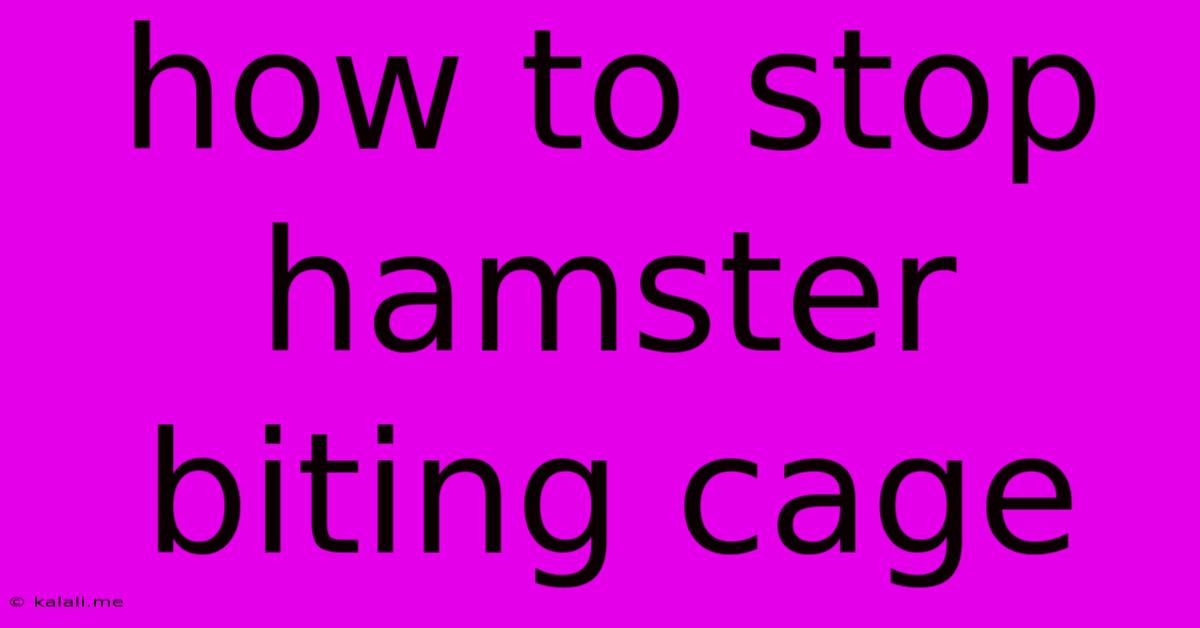How To Stop Hamster Biting Cage
Kalali
May 21, 2025 · 3 min read

Table of Contents
How to Stop Your Hamster from Biting Its Cage
Hamsters are adorable, furry little creatures, but their seemingly innocent nibbling can sometimes turn into destructive cage biting. This frustrating behavior can damage your hamster's home and leave you wondering what to do. Understanding the reasons behind this behavior is the first step towards finding a solution. This article will explore common causes and provide effective strategies to stop your hamster from biting its cage.
Why is My Hamster Biting Its Cage? This seemingly simple question often has multiple answers. It's rarely a single issue, but rather a combination of factors that need addressing.
Common Causes of Cage Biting
- Boredom and Lack of Enrichment: Hamsters are naturally active creatures. A boring cage lacking sufficient toys, tunnels, and activities can lead to frustration and destructive chewing. Think of it like a child left unsupervised with nothing to do – they might find mischief!
- Insufficient Space: A cramped cage restricts your hamster's natural urge to explore and forage. This confinement can lead to stress and subsequent cage biting.
- Improper Cage Material: Some hamsters are more prone to chewing than others, and certain cage materials are more appealing targets. Cheap plastic cages, for example, are easily chewed through.
- Dental Problems: Overgrown teeth can be painful and cause discomfort. Chewing on the cage might be an attempt to alleviate this pain.
- Stress and Anxiety: Changes in environment, loud noises, or interactions with other animals can cause stress, manifesting as destructive chewing.
- Nutritional Deficiencies: While less common, dietary deficiencies can sometimes contribute to unusual behaviors, including cage biting.
How to Stop the Biting: Practical Solutions
Now that we understand the why, let's tackle the how. Implementing these solutions can significantly reduce or eliminate cage biting:
- Enrich the Environment: This is arguably the most important step. Provide a spacious cage with plenty of hiding places, tunnels, chew toys (made of safe materials like wood or cardboard), wheels, and climbing structures. Rotate toys regularly to keep things interesting. Consider adding sand baths for burrowing. A happy hamster is less likely to bite its cage.
- Choose the Right Cage: Opt for a cage made of strong, chew-resistant materials like wire mesh (ensure the spacing is appropriate to prevent escapes) or solid metal. Avoid cheap plastic cages. Size matters! The bigger, the better.
- Provide Appropriate Chew Toys: Supply a variety of chew toys specifically designed for hamsters to satisfy their natural chewing instincts. This redirects their chewing energy away from the cage.
- Regular Veterinary Checkups: Schedule regular checkups with an exotic animal veterinarian to ensure your hamster's teeth are healthy and to rule out any underlying medical conditions.
- Minimize Stress: Maintain a calm and quiet environment for your hamster. Avoid sudden noises or movements that could startle them. Handle your hamster gently and respectfully.
- Ensure Proper Nutrition: Feed your hamster a balanced diet that meets all their nutritional needs. Consult a veterinarian or a reputable hamster resource for dietary recommendations.
Prevention is Key: By addressing these potential causes proactively, you can significantly reduce the chances of your hamster developing the habit of cage biting in the first place. Remember, a happy, healthy, and stimulated hamster is a less destructive hamster. By providing a stimulating and enriching environment, you’re not only preventing cage biting, but you're also ensuring your furry friend lives a happier, healthier life.
Latest Posts
Latest Posts
-
Why Is Villager Not Taking Job
May 21, 2025
-
Push Me Pull Me Doctor Dolittle
May 21, 2025
-
How To Move A Washing Machine Alone
May 21, 2025
-
How To Remove Glue From Wall Tiles
May 21, 2025
-
How To Get Associate Professor Title
May 21, 2025
Related Post
Thank you for visiting our website which covers about How To Stop Hamster Biting Cage . We hope the information provided has been useful to you. Feel free to contact us if you have any questions or need further assistance. See you next time and don't miss to bookmark.